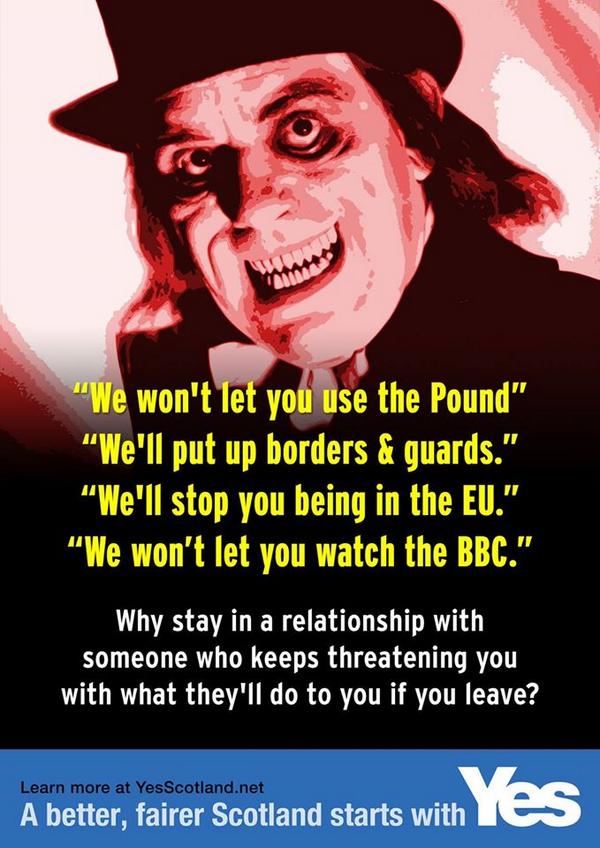Today, a friend tweeted that he would be bowing off twitter for a few weeks; this follows others of my acquaintance in the No camp who have done likewise.
It is not my intention to do so (at least not completely) but you should know the reasons why people feel this way.
First, a message to the hardcore, otherwise known as “Radical Independence Campaign”, “Scottish Socialist Party”, cybernats, etc.
It is your right to disagree with anyone.
However, you might like to consider that you may be mistaken to characterise those who disagree with you as “a wanker, a racist, a snob, a Quisling, a fascist, a warmonger, a coward, an idiot, a liar, uncaring of the poor, and someone who would have kept Nelson Mandela in prison” and to hold us responsible for the global banking crisis, the MPs expenses scandal and NHS privatisation in England. (Also please leave the c-word to the literate, like the Earl of Rochester)
Please just consider that like me, they might be better described as “a social democrat who prefers devolution to independence.”
By the way, please feel free to describe me as an apologist for the invasion of Iraq. See my blog on the subject here. Since then, I continue to agree with the forces of democracy and freedom in Iraq who also supported the invasion, above all the Kurdish people who again face dire peril, this time from ISIS.
And a message to mainstream/official Yes Campaign:
In the course of a conversation about friends and comrades who have quit Twitter completely, I stumbled on the phrase “like a 24 hours a day argument with a Trot.” At this point, the light-bulb went on: that is exactly what it is like, and in some cases, exactly what it is.
Like Militant and other far-left groups who infiltrated the Labour Party in the 1970s and 80s, many Yessers are in the grip of cult-like certainty and do not shrink from intimidation in word and deed.
One manifestation of this is the behaviour of your Yes supporters in public, which has consistently included an element of intimidation. This ranges from the picketing and disruption which makes the arrangement of Better Together meetings difficult, to the hostile mobs which greet Jim Murphy on the streets of Scotland. Here is an example which features official Yes blue jackets.
People now openly talk of not putting No posters in their houses for fear of having their windows put in; and you have surely heard of cars bearing No stickers being vandalised
So, please be careful who welcome into your Yes camp. They do your cause no good and shame Scotland.
You may also wish to reflect on the experience of the Labour Party and the Militant Tendency. Militant’s aim was to destroy the Labour Party by implosion, and to replace it as the party of the British working class. So do not be surprised if your far-left adherents follow the same pattern. The signs are as follows:
- assertion that the cause (in this case independence) will of itself bring about miraculous results
- messianic belief that the cause is a force of destiny, i.e., that “history is on our side”
- hatred and belittling of those who do not share the cause (see above)
- irrational dismissal of impartial information such as opinion polls and the media as being in the hands of the enemies of the people
- conspiracy theories (like advising voters to not use pencil provided as it can be rubbed out and falsified)
These are then followed by denunciation of aims and leaders of the cause when miraculous results do not appear. So watch out after 18th September, whatever the outcome. You are being taken for “useful idiots” and being supported by the leftists “like a rope supports the hanged man” as Lenin also puts it.
To everyone else, by the way:
I am not stopping using this blog and the letters pages to campaign for No. Just today (Saturday 23rd August) I have written to the Herald on the subject of Yes intimidation.
I will just be taking a lower profile on Twitter. I have – maybe belatedly – remembered the wise words that it is best to avoid arguing with an idiot in public, as onlookers may not be able to tell the difference.
At the same time, my admiration for those with more stamina in the NO camp is enormous.
Finally, to the cybernats once more:
Three words, two of which are “get” and “to”. I feel better for that.

